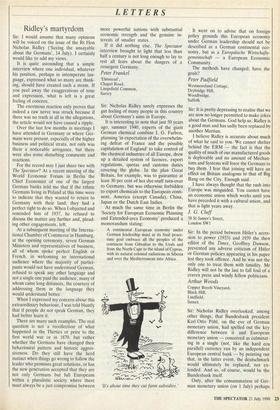LETTERS Ridley's martyrdom
Sir: I would assume that many opinions will be voiced on the issue of the Rt Hon Nicholas Ridley (`Saying the unsayable about the Germans', 14 July). I certainly would like to add my views.
It is quite astounding that a simple interview where one individual, whatever his position, perhaps in intemperate lan- guage, expressed what so many are think- ing, should have created such a storm. If you peel away the exaggerations of tone and expression, what is left is a great feeling of concern.
The enormous reaction only proves that indeed a raw nerve was struck because if there was no truth at all in the allegations, the article would not have caused a ripple.
Over the last few months in meetings I have attended in Germany or where Ger- mans were present, especially of the higher business and political strata, not only was there a noticeable arrogance, but there were also some disturbing comments and reactions.
For the record may I just share two with The Spectator? At a recent meeting of the World Economic Forum in Berlin the Chief Economist of one of the largest German banks told me that if the ethnic Germans living in Poland at this time were to indicate that they wanted to return to Germany with their land, they had a perfect right to do so. When I objected and reminded him of 1937, he refused to discuss the matter any further and, plead- ing other engagements, left.
At a subsequent meeting of the Interna- tional Chamber of Commerce in Hamburg, at the opening ceremony, seven German Ministers and representatives of business, all of whom spoke perfect English or French, in welcoming an international audience where the majority of partici- pants would not have understood German, refused to speak any other language and not a single one paid the audience, many of whom came long distances, the courtesy of addressing them in the language they would understand better.
When I expressed my concern about this extraordinary behaviour, I was told bluntly that if people do not speak German, they had better learn it.
There are many such examples. The real question is not a recollection of what happened in the Thirties or prior to the first world war or in 1870, but rather whether the Germans have changed their behavioural pattern and historic aggres- siveness. Do they still have the herd instinct when things go wrong to follow the leader who promises great solutions, or has the new generation accepted that they are not only Germans but full Europeans within a pluralistic society where there must always be a just compromise between more powerful nations with substantial economic strength and the genuine in- terests of smaller states.
If it did nothing else, The Spectator interview brought to light that less than half a century is not long enough to lay to rest all fears about the dangers of a resurgent Germany.
Peter Frankel
`Elmstead', Chapel Road, Limpsfield Common, Surrey


















































 Previous page
Previous page